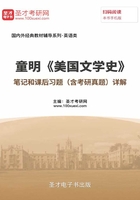
4.2 课后习题答案
1.What were the feelings of the new nationhood? What are the connections between nationalism and romanticism?
Key: The new nationhood was proud of itself, but as a young country it could not be quite free of a sense of inferiority or “colonial complex” in the face of Europe.
Nationalism often goes hand in hand with romanticism. The special psychological make-up of nationalism gives romanticism its own particular characteristics.
2.Who are the most accomplished writers in this time period? How differently do they define Americanness?
Key: Literary giants such as Poe, Emerson, Thoreau, Hawthorne, and Melville are the most accomplished writers in this time period. Soon, their achievements would be matched by those from Whitman and Dickinson, among others.
3.What are the five characteristics of Romanticism as listed in this chapter? Please discuss each by offering examples from authors you have read in this period.
Key: First, romanticism celebrates the triumph of feeling and intuition over reason. And it is suspicious of the rationalist explanations of the universe and human nature by the Enlightenment writers. Since romantic writers placed a higher value on the free expression of emotion and on the power of imagination, they showed greater interests in the psychic states. As a result, characters in romantic stories sometimes showed extremes of sensitivity, such as fear of the dark and the unknown. For example, Edgar Allan Poe’s “The Fall of the House of Usher” depicts the character’s extremes of sensitivity in a very vivid and horrifying way, which arouses the reader feelings of fear.
Second, if the Enlightenment had annulled the Middle Ages, romanticism looked back to the Middle Ages with a nostalgic fascination. Also, the “Orient”—especially its “glorious” past—was a source of fascination. Gothic styles, “oriental” styles and other exotic styles were favored by romanticists. For example, Melville wrote several famous works following the exotic styles, such as Typee and Mardi.
Third, romanticism exalted the individual over society, thus showing a strong disliking for the bondage of convention and customs. As it is sometimes the contradiction, nostalgia for the past traditions is also a romantic strain. For example, Thoreau left society and went to the Walden Pond to live, there, he wrote his famous work Walden.
Fourth, nature is believed to be the source of goodness and the antithesis of society as society is inclined to be corrupt. A related manifestation is the moral enthusiasm exhibited in some romantic writers. For example, Emerson turned his attention to nature, and thought that nature had the function of healing. He left his Nature for the later generations.
Fifth, cultural nationalism—or the proud belief in one’s own cultural genius and heritage—is also a striking characteristic of romanticism. For example, Whitman was devoted himself to express the national spirit of America as a young man. His famous poet “There was a Child Went Forth” is a typical instance.